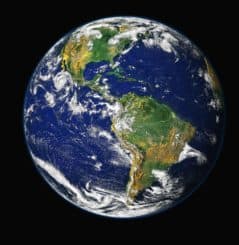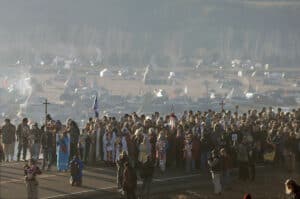
The history of our planet is one of abundance and beauty, of life and goodness. While there is also war and disease, pollution and decay, God’s dream for us is clearly the former.
The story starts (Genesis 1) with an explosion of creative energy that results in everything from comets and cumulus clouds to kingfishers and hammerhead sharks. God’s imagination is infinite, God’s joy in creating palpable. It’s all about delight, diversity, and dazzle.
The story ends (Revelation 22) with a magnificent city in which a tree with healing leaves straddles a river and bears a new crop of fruit every month. It’s all about plenty, refreshment, and life.
Everything we need has been provided—not just sustenance but also freedom, gladness, and love. Alas, we seem to prefer consumption, profit, and control—even if they come at our own and others’ expense.
Everything we need has been provided—not just sustenance but also freedom, gladness, and love. Alas, we seem to prefer consumption, profit, and control—even if they come at our own and others’ expense.
When it comes to stewarding God’s gift of creation, there’s no denying that we’ve made a mess of things. Nearly a decade ago, in the 2008 animated film WALL-E, we glimpse a near-future earth so burdened with toxins and trash that the human race has launched itself into indefinite orbit in outer space. Pampered into a stupor by the cultural purgatory of round-the-clock consumption (sound familiar?), humans have lost the ability to see beyond their screens. Their legs have atrophied from lack of use, as have their brains.
Back on earth, a winsome robot is programmed to compress and stack the trash left behind by the humans. When the little fellow locates a green sprout in the literal wasteland, one of the spaceships slowly begins to turn back toward Earth. Hope is seeded in the hearts of the people that perhaps life on earth is still possible. Having squandered it before, they now understand its true value.
WALL-E is a delightful film, but it is also a powerful and poignant film, because it tells the truth about what we’re made for and what happens when we wander from the storyline of God’s dream for us. It gives us a picture of where we’re headed and a chance to ponder where we’d rather be instead.
Although he walked the earth 27 centuries ago, the prophet Jeremiah would feel right at home in our world today. He spent most of his life railing against the spiritual defilement of God’s land, painting a vivid picture of the effects of sin. Giving voice to God’s disappointment and anger, he said things like: “I brought you into a plentiful land to eat its fruits and its good things. But when you entered you defiled my land, and made my heritage an abomination” (2:7); “How long will the land lie parched and the grass in every field be withered? Because those who live in it are wicked, the animals and birds have perished” (12:4); and “It will be made a wasteland, parched and desolate before me; the whole land will be laid waste because there is no one who cares” (12:11).
We hear Jeremiah’s voice today in the tireless warnings and exhortations of our scientists and our activists and in the heart cries of the poor, those who bear the biggest brunt of environmental degradation.
But listen, too, for Jeremiah’s hope. Although consistently pessimistic about the immediate future of Judea, Jeremiah never abandoned the hope that the people would eventually embrace God’s dream for them. Most of his dire predictions concluded with the words, “Nevertheless, I will not make a full end.” Even when Jeremiah knew that he would soon be captured, he purchased a piece of land—a significant embodiment of his hope that God’s will would prevail.
Jeremiah never abandoned the hope that the people would eventually embrace God’s dream.
As long as there are people willing to speak the truth, as long as we are willing to turn (and turn again) our hearts to the Creator, there is hope. We may be stuck in some deep-rooted and nasty habits, but history proves that with God’s help sinful people can repent and reclaim life and divine power.
Here’s one small example of that. A few years ago, convicted of my worrisome addiction to work and inability to rest, I begged my family to join me in making a concerted effort to observe a weekly Sabbath. So we have been unplugging every Sunday—we rest, we go to a park, we play together. And, as God said repeatedly upon creating the world, it is good. While initially my kids moped while I sneaked longing glances at my laptop, we now look forward to this time together. We have forged a new and better habit for ourselves.
I opened a Chinese fortune cookie once and found a proverb that feels especially apropos to our current environmental crisis and both the despair and the hope it inspires: “The best time to plant a tree is 20 years ago. The next best time is now.”
We can’t undo the past, but we can start living differently—today.
Kristyn Komarnicki is the director of Oriented to Love, a program that uses dialogue as a framework for transformation and a catalyst for unity in the church, building community through mutual vulnerability. Learn more here, and consider applying for an upcoming dialogue!


